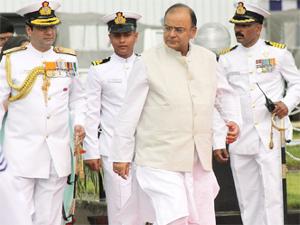New Delhi, Oct 26: Defence projects worth a whopping Rs 80,000 crore were on Saturday cleared by the government which decided that six submarines will be made indigenously and over 8,000 Israeli antitank guided missiles and 12 upgraded Dornier surveillance aircraft will be purchased.
 The decisions were taken following a meeting of the defence acquisition council, chaired by defence minister Arun Jaitley, that lasted for over two hours with defence secretary, the chiefs of all three services, DRDO chief and other senior officials attending it.
The decisions were taken following a meeting of the defence acquisition council, chaired by defence minister Arun Jaitley, that lasted for over two hours with defence secretary, the chiefs of all three services, DRDO chief and other senior officials attending it.
The bulk of the decisions went in favour of the Navy that was in dire need of up-gradation and capability enhancement.
The big ticket step was the decision to build six submarines in India at a cost of about Rs 50,000 crore rather than source it from outside.
The other major decision was to purchase 8,356 antitank guided missile of Israel worth Rs 3,200 crore rather than the US' Javelin missile for the Indian Army. The Army will also purchase 321 launchers for the missile.
Another 12 Dornier surveillance aircraft with enhanced sensors will also be bought from the Hindustan Aeronautics Ltd at a cost of Rs 1,850 crore.
The DAC also decided to buy 362 infantry fighting vehicle from the ordinance factory board, Medak in West Bengal for Rs 662 crore.
Giving details of the decision to make the six submarines in the country, official sources said a committee will now be formed by the defence ministry which will study both public and private shipyards over the next 6-8 weeks.
Following this, the ministry will issue request for proposal (RFP) to specific port that will be identified on the basis of the study which will look into whether they have the capacity and manpower to build six submarines in the same port only besides other parametres.
The submarines will be air independent propulsion (AIP) capable that will enable them to stay underwater for longer than a conventional submarine besides having enhanced stealth features.
The Navy currently has 13 operational submarines and the target set in 1999 was to have 24 by 2030.
The previous UPA government had gone in for six Scorpene submarines and the first is likely to be delivered only in 2016.
The decision to manufacture the submarines in India is in line with Prime Minister Narendra Modi's 'Make in India' pitch.
The submarines will have the capacity to be equipped with land attack cruise missiles.
The DAC also decided to buy 1,761 units of five spoke 7.5 tonne radio containers at the cost of Rs 662 crore besides acquiring 1,768 critical rolling stock — open and closed wagons for transport of military equipment at a cost of Rs 740 crore.
Both will go to domestic vendors. During his address to those attending the meeting, Jaitley said national security was paramount concern for the government.
He added that all hurdles and bottlenecks in the procurement process should be addressed expeditiously so that the pace of the acquisition is not stymied.
The DAC also approved the purchase of equipment for special operations for the Navy which remained classified.
Sources said it is basically for the elite Naval commandos Marcos.
The decision for the purchase of torpedos for the scorpene submarines and heavy calibre guns were put off today on technical grounds, sources said,adding that they are likely to be cleared soon.
The DAC was set up in 2001 as part of the post-Kargil reforms in defence sector.
The council approves the long-term integrated perspective plan for the forces, accords acceptance of necessity ( AON) to begin acquisition proposals, and has to grant its approval to all major deals through all their important phases.
It also has the power to approve any deviations in an acquisition, and recommends all big purchases for approval of the Cabinet committee on security.
In a recent conference of top commanders of the armed forces, Jaitley had said that the process of military acquisitions, which had slowed down due to "some controversies", will be speeded up with at least one meeting per month of DAC.





Comments
Add new comment